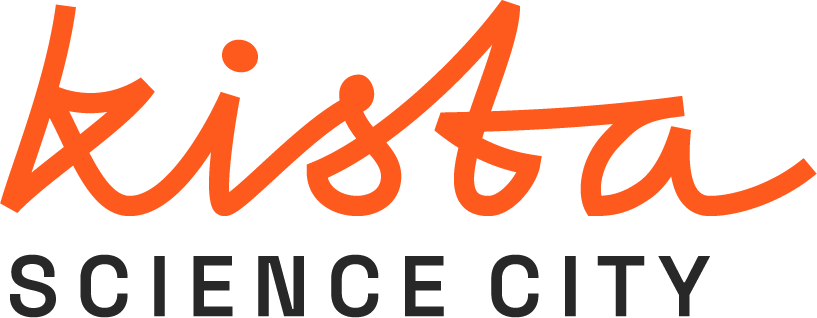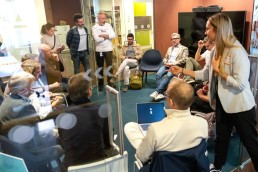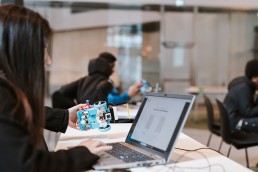Sweden’s semiconductor ecosystem now has a shared platform in Kista. Semiconductor Arena brings startups, industry and researchers together to develop skills, support companies and strengthen Sweden’s role in Europe’s semiconductor landscape.
The race for semiconductor sovereignty
Semiconductors power almost every modern system — from transport and energy to communication and health. As demand grows, Europe is investing heavily to reduce its dependence on external suppliers and secure local capacity.
Sweden has key strengths to build on: world-class research, advanced infrastructure and a strong base of specialist companies driving innovation. The challenge is to turn that technical know-how into industrial capacity, and to ensure Sweden plays a clearer role in Europe’s semiconductor future.
Semiconductor Arena
The launch of Semiconductor Arena marks a new phase for Sweden’s chip sector, bringing startups, industry and researchers closer together.
The Arena, developed by Kista Science City, KTH, RISE and Sting, is a neutral meeting ground where ideas can move beyond individual organisations and into shared initiatives. Here, companies and researchers from different fields can test ideas, share expertise and move projects forward together. By connecting strengths across the ecosystem, the Arena shortens the path from research to industrial impact and builds the networks and visibility that help companies grow.
The launch in Kista highlighted three priorities that will shape this work: attracting and training more talent, enabling companies to scale in Sweden and connecting regional strengths with both Sweden’s national strategy and Europe’s semiconductor agenda.
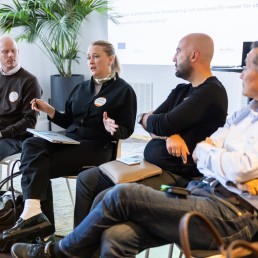
Building Sweden’s talent pipeline
The skills gap is one of the semiconductor sector’s most pressing challenges. Established companies point to an urgent need for more engineers and stronger incentives to enter the field.
“One concrete action is to reach engineers earlier in their academic journey so they see Sweden — and Stockholm in particular — as a strong hub with real career paths,” says Niklas Svedin, CTO and co-founder of Silex Microsystems, one of Sweden’s leading semiconductor companies.
Startups share the concern but see a different missing link: the difficulty of giving students and researchers clear entry points into real projects. “The most urgent need is structured competence initiatives that make it easier for students and researchers to engage with industry,” adds Louise Ribrant, VP of Business Development at Myvox, a startup specialising in MEMS ultrasound technology.
Semiconductor Arena is set up to address these needs, from early visibility to practical entry points. In the months ahead, the Arena will roll out initiatives to connect students with companies — starting with a thesis fair. Alongside this, the Electrum Lab will be made more accessible as a shared national resource, giving innovators hands-on access to state-of-the-art equipment.
Beyond engineers, companies also stress the importance of technicians and vocational roles to support large-scale production. To meet this need, the Arena will introduce new vocational training offers, preparing more people for hands-on roles in production.
Creating conditions for growth
Alongside the need for talent, another challenge for Swedish semiconductor companies lies in scaling their business. Moving from a small team to an established company is difficult. Development cycles are long and capital needs are high — and with limited financing options in Sweden, promising startups are too often acquired abroad, taking both competence and value with them.
Semiconductor Arena lowers these barriers by helping companies access infrastructure, connect with investors and build stronger ties across industry and academia.
One example of this approach is Sting’s Test Drive programme, which now includes a dedicated track within Semiconductor Arena to support researchers and startups. Test Drive is a short, workshop-based format that helps teams explore whether an idea can become a company. Concepts are tested with investors and mentors, giving them early clarity, confidence and networks.
“Being part of Semiconductor Arena connects us to a stronger innovation ecosystem at a critical time for both Sweden and Europe,” says Louise Ribrant of Myvox. “The Arena is a way to access competence, infrastructure and partners that can help accelerate development and commercialisation.”
Turning regional strengths into national influence
Sweden’s semiconductor sector has expanded quickly in recent years. Strong research environments, new startups and regional hubs are all contributing to a broader and more dynamic ecosystem. Yet much of this growth has developed in parallel, with initiatives often moving forward without alignment. Without stronger coordination, these efforts risk fragmenting — weakening Sweden’s ability to influence Europe’s semiconductor agenda and build long-term resilience.
Semiconductor Arena makes coordination day-to-day practice. Firmly rooted in Stockholm’s ecosystem, it gives local companies and researchers greater visibility by mapping actors and capabilities, showing who does what and where. By highlighting Stockholm’s semiconductor strengths, the Arena also makes it clearer what the ecosystem can contribute to Sweden’s national strategy and Europe’s semiconductor agenda.
Ultimately, coordination is about positioning — ensuring Sweden is not just part of Europe’s semiconductor agenda but able to shape it. As Niklas Svedin notes, self-sufficiency has become a central issue in Europe, making it urgent to put the semiconductor industry firmly on Sweden’s agenda. “The Arena helps connect industry, academia and policymakers — creating a stronger collective voice,” he says.
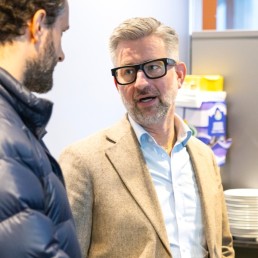
Looking ahead
Semiconductor Arena has brought Sweden’s chip sector into closer dialogue, turning collaboration into a working method rather than an exception. The next phase will build on this momentum: translating shared priorities into concrete initiatives — from clearer student pathways to new international connections.
The direction will be set by the ecosystem itself. As new needs emerge — whether in training, infrastructure or policy dialogue — the Arena provides a place to meet them collectively. Anchored in Stockholm and connected to national and EU strategies, it offers Sweden a stronger platform to act collectively in the global chip race.
Do you want to get involved? Reach out to hanna.eldh@kista.com
—
Semiconductor Arena is co-funded by the European Union and Region Stockholm and is run by Kista Science City, KTH, RISE and Sting.
Related Articles
December 9, 2025
Understanding online risks: Lisa Kaati’s research at DSV in Kista
The boundaries of conflict are shifting. Today, national security isn’t just…
